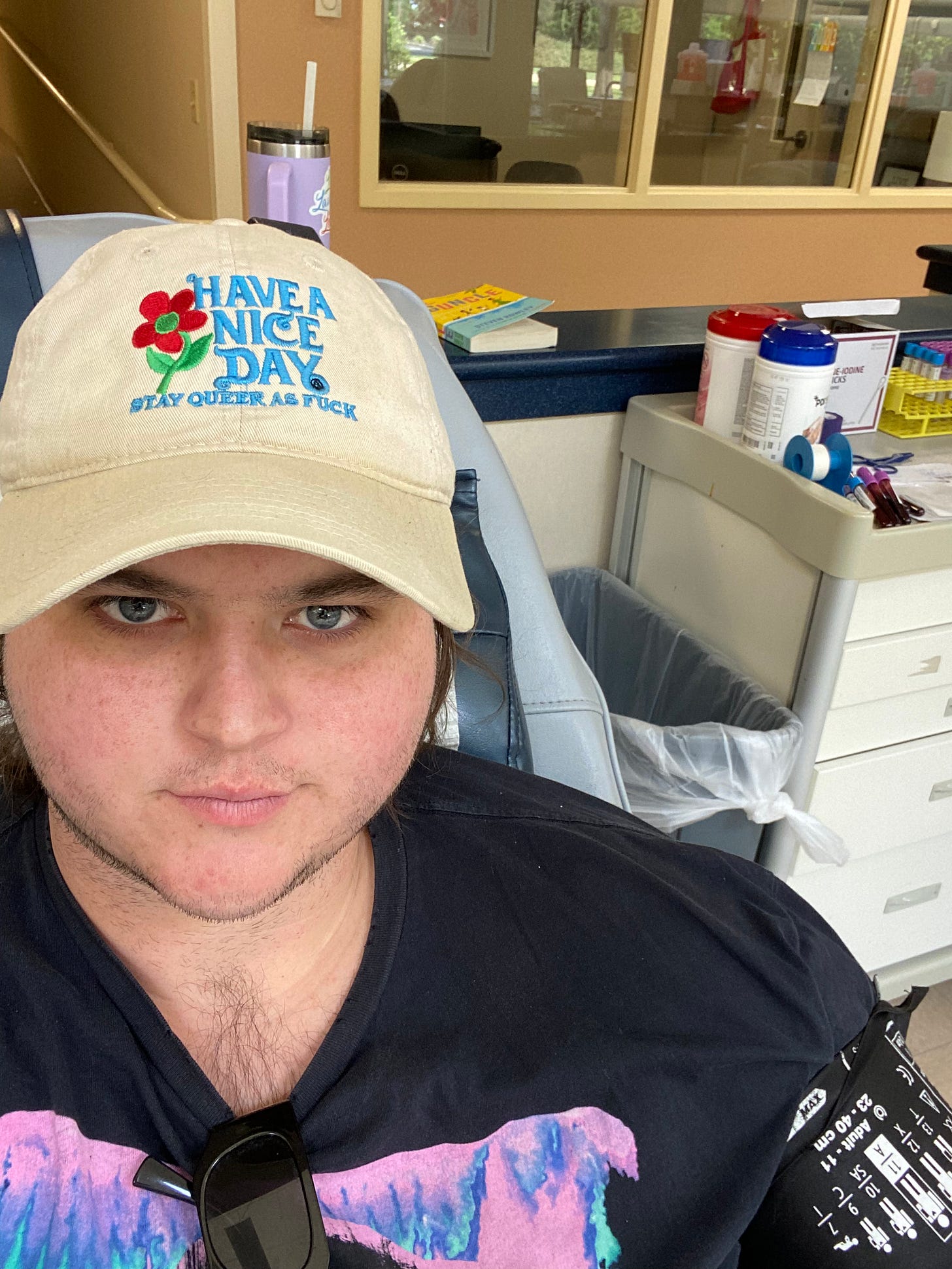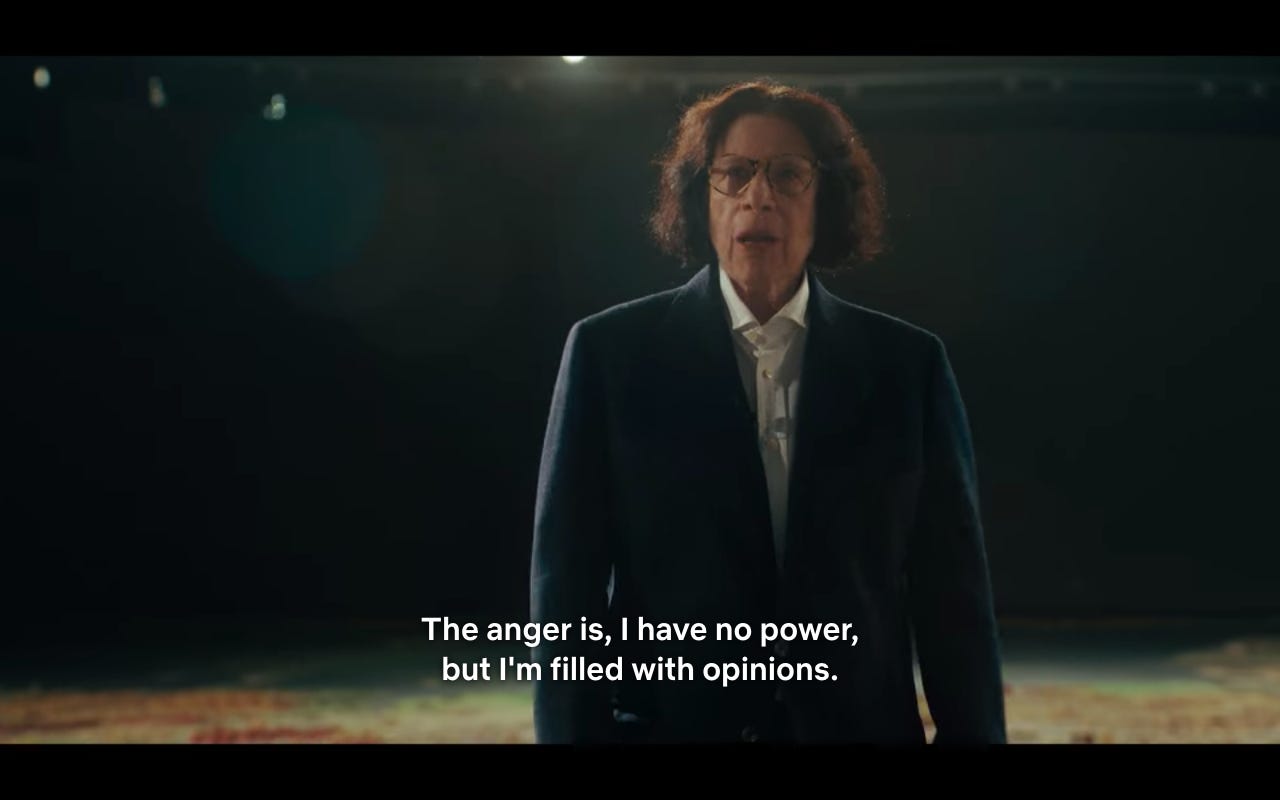In Defense of Complaining
Or the Moan-aissance, if you will.
If you are a regular reader of this newsletter, you’ve probably deduced that I’m something of an optimist. If you haven’t: PAY BETTER ATTENTION! It’s not something I’m necessarily aware of and actively trying to do in my writing. In fact, I use this newsletter as a place to engage with heavy concepts like misogyny, transphobia, and even grief. Despite the fact that I’m willing to get my proverbial hands dirty with these muddy subjects, I still find that, sometimes even to my own chagrin, I often end my pieces on a positive note. For some reason, as I type the final words of an essay at the end of a long dark night,1 I find myself on the eastern shores of my mind, seeing the light of a clear blue morning rising over the horizon. Maybe it has something to do with the fact that I send these newsletters out at 8 AM on Monday morning (did you notice? If not, refer to the second sentence in this essay) and, with the knowledge that each and every one of you are waiting with baited breath for whatever Nonna Quinn has cooked up for you, I feel a certain responsibility to get your week off to a good start. Perhaps my propensity towards positivity is entirely the fault of you, dear readership, and I can just end this essay now (if only it were that simple).
However, in a similar way to my preternatural need for independence, any astrologer worth their himalayan pink salt would also offer the Sagittarius stars under which I was born as chiefly responsible for my optimism. While I’m inclined to agree with this hypothetical astrologer, I would also acknowledge my natal Moon’s placement in Libra, as well as my Gemini ascendent. For those of you who have better things to worry about than astrology, while one’s sun sign (Sagittarius, in my case) dictates their ego and motivations, the moon sign guides one’s emotional self while their ascendent indicates the energy they put out into the world around them. Therefore, both my emotions, mirroring Libra’s scales, and my outer-self, represented by Gemini’s twins, are intimately concerned with the duality of human experience. The push that brings the waves to the shore and the inevitable and accompanying pull that sucks that water back out into the ocean.
I’ve bestowed this mini (or, let’s face it, maxi)-lesson in astrology as a roundabout way to admit to you that, while I am an optimist, I am also, as much as I wouldn’t like to admit it, a complainer.
I look at complaining like I look at smoking cigarettes. I know that both of these habits are ultimately bad for me but, by engaging in these acts, I’m chasing a high that few other exercises can provide. Coincidentally, both also happen to be especially fun when I’m drunk. But, I digress.
Complaining also shares a similar level of negative social pressure when compared to that of smoking. To understand this hypothesis of mine, one need not look further than the sheer amount of colloquialisms in place to try and dissuade me and my fellow bellyachers from participating in our favorite pastime: “no use in crying over spilled milk,” “there are bigger fish to fry,” and “every cloud has its silver lining,” to name a few. In fact, I’ve heard these expressions and others like them so frequently that I don’t even have to hear them uttered anymore; instead, whenever the claws of negativity begin to wrap me in their fatalistic grasp, these phrases are already there in the recesses of my mind, challenging me to dismiss those feelings and rely on my resilience to free me from those clutches.
However, these averse aphorisms never really make me refrain from complaining. They simply distinguish those people with whom I shouldn’t be sharing my most clever criticisms. Therefore, due to the existence of negative attitudes associated with my occasional attitude of negativity, much like a smoker, I, as a complainer, often find myself searching for a space to talk shit; I could be at work, or at the club, hell, I could find a way to gripe about someone who gave me a funny look at the blood blank. “Then, from across the canteen, she gave me the hairy eyeball as she ate her Mrs. Fields oatmeal raisin cookie. I think she was jealous that my blood type is B negative and they’re always calling me.”
Feeling my way around for a sounding board for some of my more undesirable thoughts, I’m trying to determine who’s game to join me in my habit and who, often feigning a certain holier-than-thou attitude, is not. When I cannot find a space like this one, I, much like a smoker frantically searching an amusement park for that random gazebo where they can smoke, sometimes have to temper an ungodly urge to get violent.
Somehow, though, despite all of this anti-kvetch sentiment that has existed within the culture, I feel the tide beginning to turn. My fellow complainers and I are coming out of those dark corners in the club, taking our workplace critiques somewhere other than the water cooler, and confronting people publicly at the blood bank. Leading this charge out of the darkness, I would contend, is an influx of pro-complaining media that has emerged in the past couple of years. Two such examples that I believe are especially significant to the cause are the Very Delta and I’ve Had It podcasts.
For my readers living far underground (read: outside of gay Twitter), Very Delta is “a luxury public access podcast and YouTube talk show” wherein the host, Emmy award-winner and female impersonator Delta Work, “look[s] gorgeous, speak[s] extemporaneously, and invite[s] fascinating people to sit on the couch and get Very Delta.” This program was inspired primarily by Delta Work’s own Instagram lives and podcast appearances, which found her pontificating on everything from drag show etiquette, to fast food service, and even some juicy details of her time doing RuPaul’s hair on Drag Race. To begin every episode, Delta Work “goes off” for about twenty minutes. She has used this time to share tips about shopping at Ross Dress for Less, the difference between compensation and facilitation, and, most famously, an experience she had in a Subway drive thru. Any other individual talking about these seemingly mundane topics might bore an audience but, as one YouTube commenter put it, “she talks like she is addressing a world shattering phenomenon in front of the UN, broadcasted to every news outlet in the world, the pois[e], the professionalism and diplomacy.”
In a similar vein, the I’ve Had It podcast finds co-hosts Jennifer Welch and Angie “Pumps” Sullivan expounding upon what they have “had it” with in a given week. Their podcast gives them a platform to air their grievances on a variety of political and pop cultural news items, and has featured guests like the Pioneer Woman, Suze Orman, and even Alexandria Ocasio-Cortez. With each episode, Oklahoma City residents Jennifer and Angie, through providing some top-level shit talking among friends, redefine and challenge what exactly white, southern womanhood is and can be.
While both of these shows ultimately boil down to people grumbling for about an hour straight, each of them attracting tens of thousands of views per episode exposes a much-wider cultural interest in complaining. Not just any complaining though, as I would argue that Delta, Jennifer, and Angie are all artful bellyachers. Delta Work is not simply saying, “I went to Subway and they put too much mayo on my sandwich.” Rather, through setting the scene of her experience, particularly when the girl making the sandwich applied the mayo to it, she manages to make her audience understand her questioning of the title of “Sandwich Artist.” When Jennifer and Angie discuss the rolling back of abortion access in the United States, they are not simply saying “this is a really sad regression.” Instead, they use their platform to cuss out the members of the Supreme Court as well as our representatives in Congress who have allowed for the elimination of these protections. They are all, to some extent, bitching and moaning but they are doing so with panache. Furthermore, in making their grousing entertaining, I would argue that they challenge their respective audiences to engage with those aspects of our society they are taking umbrage with in a deeper way.
That deeper engagement gets to the heart of something that a good complaint relies on: the understanding that conditions can improve. Delta does not complain about Subway because she has given up on the company and Jennifer and Angie do not complain about abortion access because they have lost hope in their country. Rather, all of them know that these critiques can be addressed and the entities they are criticizing can be made better. In contrast, a bad complainer has already given up entirely. Good complainers, like Delta, Jennifer, Angie, and, of course, yours truly, are those that refuse to accept failure as an option, opting instead to bang our drums until we can annoy someone enough to listen.
Therefore, in spite of whatever judgements may befall me, I will continue to complain. As I discussed at the beginning of this piece, I’m generally an optimistic person. In fact, I’ve used this very publication to discuss the importance of gratitude and my reliance on positivity. However, I also possess that Gemini and Libra energy causing me to recognize that, if mindsets like gratitude and positivity are important, so too must be their opposites. Perhaps, then, my love for complaining is just another manifestation of my Sagittarian optimism. Whether it is or not, ultimately, I’m proud of myself for not pushing negativity away; for allowing myself to, at times, plunge into its depths. Now, when it comes to swimming in those depths… well, that might just be a topic for another week.
This week’s recommendations:
Anatomy of a Fall (2023), dir. Justine Triet
Lisa Frankenstein (2024), dir. Zelda Williams
Kathryn Hahn introducing Kylie Minogue at the People’s Choice Awards
Season Six of The Real Housewives of New York City
No, seriously! Last Sunday night, I went to bed at 5 AM after finishing the newsletter. I have a problem and this essay, much like the others, is a cry for help!





Moan-aissance album when
If complaining was a drug I’d be on the streets of Kensington rn. I feel that